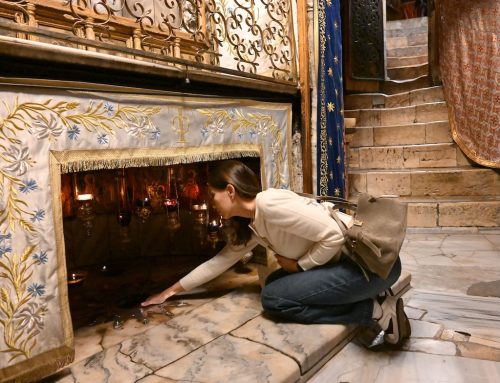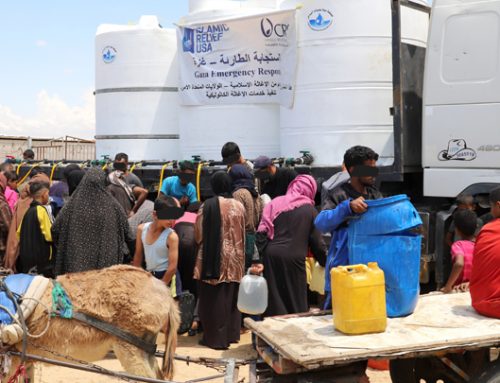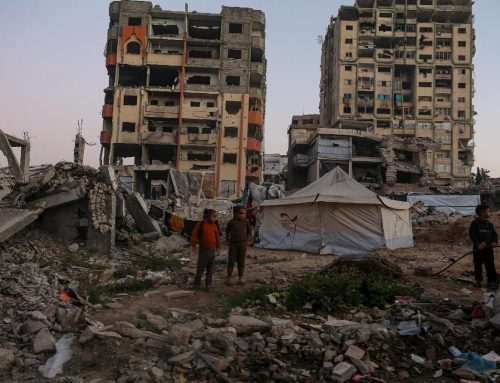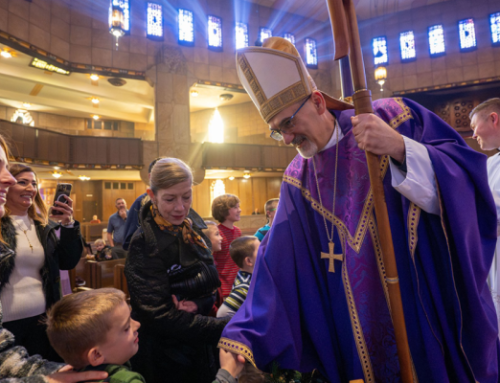In the Palestinian city of Nablus, a Melkite Christian priest can watch satellite broadcasts of American televangelists appealing for money for Russian Jews to settle in the Holy Land.
In the Palestinian city of Nablus, a Melkite Christian priest can watch satellite broadcasts of American televangelists appealing for money for Russian Jews to settle in the Holy Land. But he cannot travel to his hometown of Haifa, less than 50 miles away. Because he’s Palestinian, the Israelis won’t let him through the checkpoints.
That’s just one ironic story that Tennessee-based writer Joel Carillet has brought back from his several visits to Israel and the West Bank and Gaza. Most recently he traveled there in November and December with the Ecumenical Accompaniment Programme in Palestine and Israel, or EAPPI, an initiative of the World Council of Churches that opposes the Israeli occupation and monitors human-rights abuses.
Rich Gorman, a first-year student at Emmanuel School of Religion in Johnson City, Tenn., made his first trip to the region in January, spending almost three weeks there under the auspices of the Holy Land Christian Ecumenical Foundation (HCEF), a group of American Christians that aims to inform American Christians about the plight of fellow believers in Palestine.
"I know it was a scripted experience, to get your feet wet," he said when Carillet, he and I sat down last week to talk about their visits. "Still, I was struck by the sense of hopelessness among the Palestinian people."
The men, both 33, spent most of their time among Palestinian Christians, and they came back with similar stories of despair, hardship and growing disappointment with American Christians.
While the great majority of Palestinians are Muslim, a Christian community dating back to New Testament times still exists, embracing Roman Catholics, Eastern Orthodox, Lutheran, Anglican and Melkite, a Roman Catholic group that holds to early Eastern Christian rites.
The Israeli-Palestinian conflict is distressing Christians as much as anyone. Probably fewer than 200,000 Christians live in the West Bank and Gaza, but even that the number is shrinking.
"For Christians, it’s an economically hard to place to live," according to Carillet. "They can’t go to another city for decades. But anyone can come there if they’re Jewish."
Longstanding Israeli policies have been magnified by the new security boundary, a serpentine fence and concrete wall that, when completed, will twist through the country more than 430 miles, about the length of Tennessee. (An aerial view is here.) Instead of following recognized borders, however, the Israelis thrust it deep into Palestinian territory in many places, sometimes within a few feet of homes, isolating people from relatives, jobs, roads, orchards, gardens, schools and medical care.
It also separates Christians from their church communities. Congregations in the West Bank, particularly in the north, are being strangled. Pastors and priests cannot visit their flocks. Economic hardship is forcing many Palestinians to depart, draining churches of members and money. (Unemployment in Palestine runs around 25 percent, according to the CIA World Factbook. Almost half the people in the West Bank live under the poverty line, and 63 percent do in Gaza.)
Christian communities dating back to the first or second century will likely die in the next few years.
"Until now, there’s always been living congregations in the West Bank," Gorman said. "The real threat for Christians – and I know this sounds alarmist – is that by 2020, churches will be present in the Holy Land only for tourists. Right now, three churches on the Mount of Olives are separated from their people (by the security barrier). About 2,000 Christians can’t get to their churches."
When Carillet asked a Roman Catholic priest in Ramallah about the future, the priest laughed. "There is no hope; there is no future," he replied.
Palestinian Christians are not only growing hopeless, Carillet and Gorman agreed. They are frustrated with American Christians because of the unquestioning support that many conservative Christians give to Israel, led by such high-profile figures as John Hagee and Jerry Falwell.
"The greatest harm done to Christians (in Palestine) after the Israelis is done by Christian fundamentalists," according to Sami Musallem, the governor of Jericho and a Lutheran. He told Carillet that American Christians "support people who do not support Christianity. I’m sure people in Zionist churches are not extremists in normal life – but in groups, they sound like people who are willing to kill Palestinians."
"There’s a lot of anger and resentment aimed at American Christians by Palestinian Christians," Carillet said. "There’s bewilderment. It doesn’t register, the level of disconnect."





